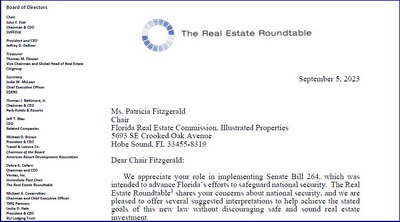
Funding for the government will expire Sept. 30 if Congress cannot muster a short-term stopgap patch to keep federal agencies open and avoid a partial government shutdown. House Speaker Kevin McCarthy (R-CA) faces strong opposition from members of the conservative House Freedom Caucus to strike a deal with the Biden administration, which has submitted an additional $44 billion request for disaster relief, border security, and Ukraine. (CQ, Sept. 5 and AP, Aug. 21)
Flood Response Funding
Tax and Other Policy

Hearings & Climate Disclosure Rule

The policy issues above and many more will be the focus of discussions during The Roundtable’s Fall Meeting (Roundtable-level members only) on Oct. 16-17 in Washington.

On Sept. 5, The Real Estate Roundtable urged the Florida Real Estate Commission to clarify their implementation of a recently enacted law that could have negative consequences for foreign real estate investment in the state. Twenty states have enacted restrictions on foreign investors in real estate or agricultural land, eight states are considering similar measures, and other states are exploring the issue. (Roundtable letter)
Restrictions on Foreign Investment
Roundtable Concerns

DeBoer requests the Florida Commission to “carefully consider the impact of your agency’s interpretation and implementation efforts of this new law so that it does not prohibit major investments in the state, which are safe from control by foreign countries of concern and promote growth without sacrificing the security or economic interests of Florida.”